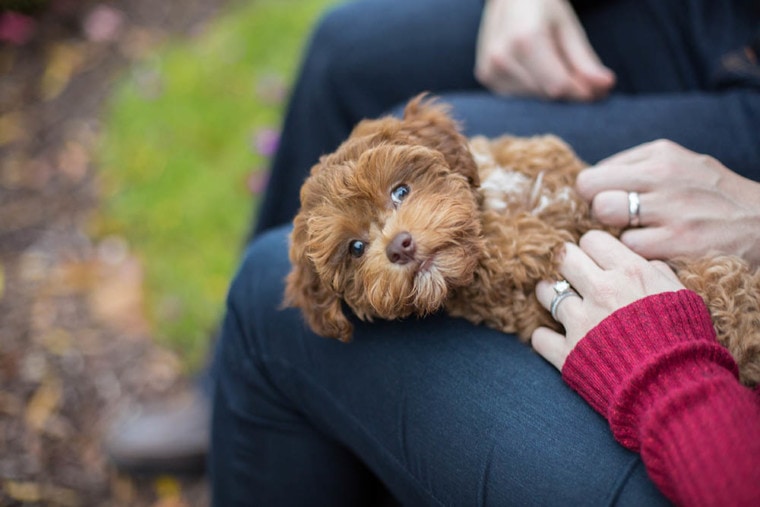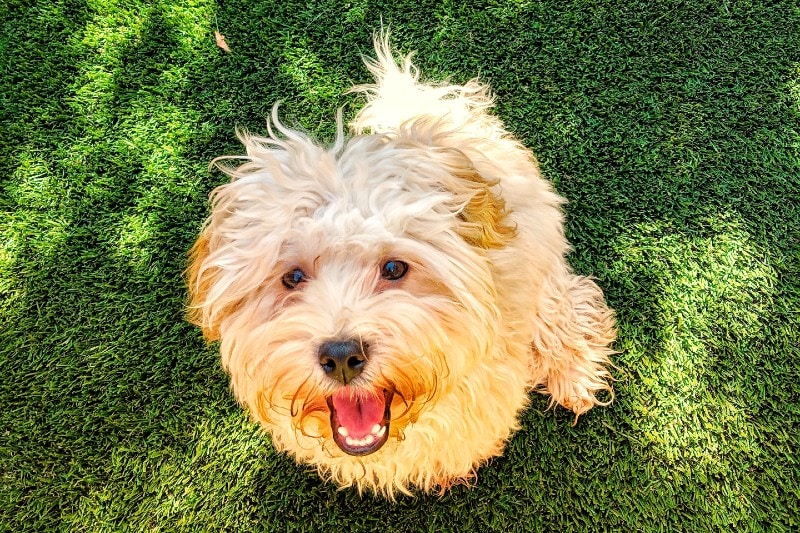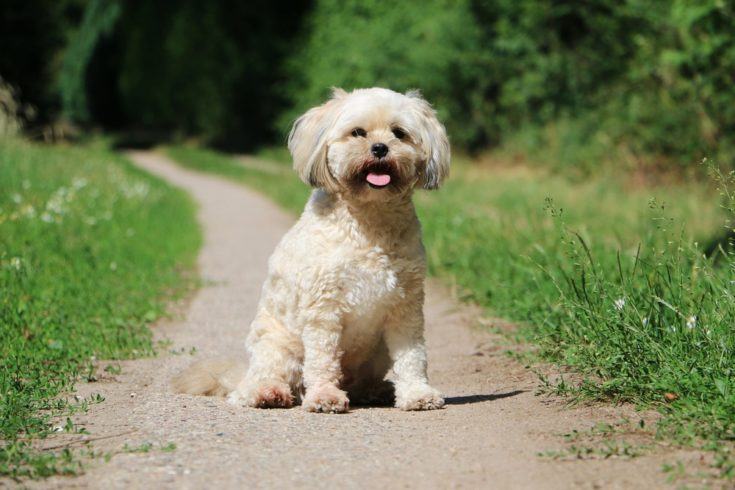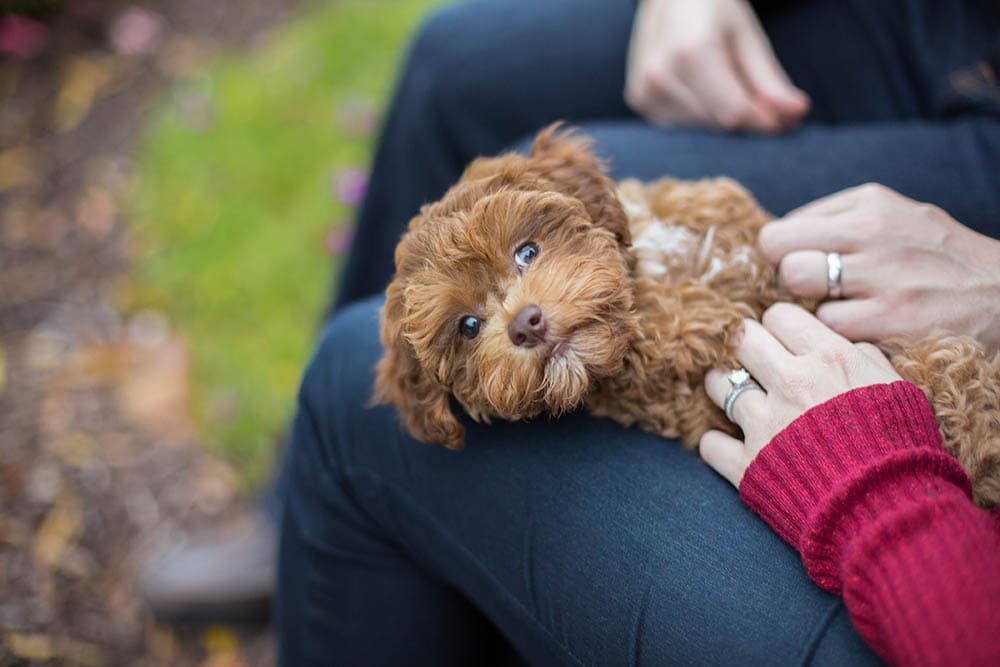[ad_1]

A mix of the Havanese and Miniature Poodle, the Havapoo is an adorable, friendly, and often allergy-friendly crossbreed growing in popularity. These sweet pups are known for their intelligence, and bonding tightly with their human family. If you have a Havapoo (try saying that ten times fast!) or are considering adding one to your household, you might be curious about the lifespan of this breed. On average they live from 13-16 years. Let’s discuss how long Havapoos live and some factors that impact their lifespan.
What’s the Average Lifespan of a Havapoo?
Being a cross between two breeds, the Havapoo is less predictable regarding its size, coat type, and lifespan. They may more closely resemble one parent breed over the other or be an even mix. The best way to determine the average lifespan of a Havapoo is to look at the typical lifespan of the two parent breeds.
Havanese and Miniature Poodles are both long-lived dogs, and you can expect a similar lifespan from the Havapoo. The average lifespan of a Havapoo, based on that of their two parent breeds, is 13-16 years. As you can see, the maximum lifespan of these dogs could stretch well into their teens, so if you adopt one as a puppy, you can hope to have them with you for a long time.

Why Do Some Havapoos Live Longer Than Others?
Many of the factors below apply to most dogs, not just Havapoos, but we will highlight which of these will most likely affect this breed in particular.
1. Nutrition
Havapoos don’t typically have special nutrition needs, but what they eat can affect how long they live. Specifically, if a Havapoo overeats and becomes overweight, it can shorten their life. Research shows that overweight dogs, on average, have a lifespan of up to 2 years shorter than those with a healthy body condition.
Eating the wrong foods can also lead to the development of dental disease and tooth problems which can also impact overall health and longevity.
2. Living Conditions
As small breed dogs, the Havapoo’s health may be more vulnerable to the effects of poor living conditions, which may shorten their lifespan. Sadly, there are unethical breeders and puppy mills commonly produce many popular small hybrid breeds. These dogs often live in unsanitary conditions that cause health problems like parasites, injuries, or illness. Puppies purchased from these breeders may not live as long because of their less than ideal start in life, and adults rescued from these conditions may have similar problems.
If you are looking to adopt a puppy, always insist on seeing the mother and where they were raised. Reputable breeders will always be happy to accommodate this.

3. Size
In general, small breed dogs like Havapoos live longer than large breeds, and the miniature poodle has fewer inherited problems than standard poodles. However, you might see “teacup” Havapoos that are deliberately bred tiny. These abnormally small dogs are much more likely to suffer from genetic health conditions that can shorten their lives.
4. Sex
Unneutered male dogs of any breed, including Havapoos, are more at risk of wandering off in search of females in heat. This could lead to shorter lifespans if they fall victim to vehicle accidents or predators. Intact male and female dogs are often more aggressive with each other, putting them at higher risk of injury and shorter lives.
Females that are not spayed have a significantly higher risk of developing mammary tumors, and are also at risk of infections of the womb (uterus) called pyometra, which if not treated can be fatal.
5. Genetics
Inherited health conditions are the most unpredictable factor in a crossbreed. Havapoos could inherit any genetic issue common in Poodles or Havanese; they may be fortunate and not inherit any of these problems, or unlucky enough to inherit diseases seen in both breeds. Neither parent breed is prone to many major health issues, but both commonly suffer from joint problems, including patella luxation (when the kneecap is mobile rather than fixed in place) and a condition known as Leggs-Perthe disease (avascular necrosis of the femoral head) which results in the top of the femur becoming weak and breaking.
Poodles can inherit seizure disorders like epilepsy, retinal disorders that may cause blindness at a young age, and degenerative heart disease. However, they have fewer significant hereditary health issues than their larger counterparts, the Standard Poodle.
The main health concern seen in the Havanese are portosystemic shunts. A portosystemic shunt occurs when the major blood vessel that carries blood to the liver does not develop properly, causing toxins to build up in the body. It is a condition that can often be corrected, but will significantly reduce life expectancy if not.

6. Breeding History
As mentioned previously, female Havapoo that aren’t spayed or are spayed later in life are at higher risk of developing mammary cancer. Breeding can be hard on a dog’s body, and pregnancy or birth complications can occur. Puppy mills often breed females more frequently than is recommended, which can put unnecessary stress on them and potentially shorten their lives.
7. Healthcare
Lack of preventative health care can certainly shorten a Havapoo’s life. Without vaccines, a Havapoo may catch a dangerous, preventable disease. Regular healthcare can also help catch medical issues like cancer or eye problems early when treatment has a better chance of success.
Havapoos are also more prone to dental disease due to genetic factors and, quite often, a tendency to not eat or be fed foods that encourage lots of chewing.
The 3 Life Stages of a Havapoo
Puppy (0-12 months)
During this stage, they grow and mature physically and mentally. Their puppy teeth fall out and are replaced by the adult version by 5–6 months. A Havapoo will generally reach full size by the time they’re about 8 months old. It is during puppyhood, particularly the first 16 weeks, that behavior is most impacted by experiences and socialization. Although behavior will not directly affect lifespan, it can impact the interactions they will have with humans and other dogs, which may have larger effects on health.
Adult (1-9 years)
Adulthood accounts for the longest stage of a Havapoo’s life. Because of their longer lifespan, small breeds like the Havapoo aren’t considered seniors typically until about 9-10 years old. Adult Havapoos have finished growing and developing, but are vulnerable to becoming overweight and to dental disease.

Senior (9+ years)
At about 9-10 years, Havapoos are considered senior dogs. Age-related health conditions, such as decreased vision or joint pain, may start to emerge. Your Havapoo may need more frequent checkups or blood tests to monitor for medical conditions like diabetes or kidney disease that may develop with age.
The geriatric Havapoo will likely show signs of arthritis (stiffness, slower movements, panting or sleeping more) and they can also develop senile dementia, becoming more easily confused or disoriented.
How to Tell Your Havapoo’s Age
The most common method for determining a Havapoo’s age is to check their teeth. Up until the adult teeth come in, you can usually tell a puppy’s age fairly accurately based on which baby teeth they’ve lost. By the time they are 6 months old, they will have lost their baby teeth and all their adult teeth should be present. It is usually possible to estimate age between 6 months to 2 years based on the wear and condition of the teeth. This method can be tougher for adult dogs because dental disease can be an issue for Havapoos, so the amount of gingivitis or tartar may not necessarily reflect their age.
Gray hairs on the face and muzzle indicate that a Havapoo is middle-aged or older, but this can also vary by individual dog. When entering the senior lifestage, dogs will develop something called nuclear sclerosis, where the eyes start to appear more cloudy. This is a normal change and does not cause any pain or discomfort, but over time will reduce how much light reaches the back of the eye. It is different to cataracts, which look more solid and pearlescent, or uveitis, which is a painful inflammatory condition.
Conclusion
With an average lifespan of 13-16 years, the Havapoo is one of the longer-lived breeds. Several factors can influence how long they live, but the Havapoo is generally healthy overall. As you research the Havapoo to determine if it’s the breed for you, keep their estimated lifespan in mind. Any pet requires a lifetime commitment, but some breeds, like the Havapoo, have a longer lifespan to consider.
Featured Image Credit: Tara Lynn and Co, Shutterstock




